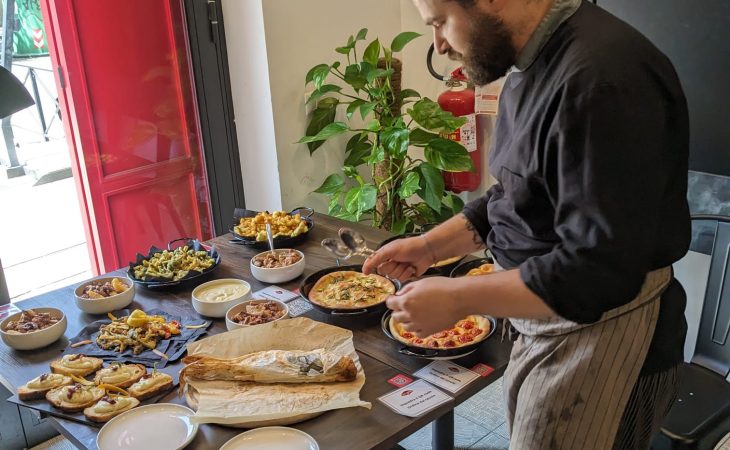Teaching requires a lot of commitment and passion, what are the most important aspects to perform at your best
this activity?
One of the fundamental things about teaching is the ability to pass on what you have learned; play-force you have to be lucky to have had a great teacher/great
teachers. We must also try to empathically enter into the mind and being of the possible student in front of us; try to be as malleable as possible because the
individuals are obviously all different.
I think this is one of the most beautiful parts of my teaching, being able to pass on your knowledge, somehow creating a continuum between what you are
And what you can give the student.

What are the key skills for working within the culinary industry?
Beyond the technical skills, which are learned through the course and through practice
you do, I think one of the best qualities is humility and the ability to put yourself out there,
In being with other people. This is one of the key things,
because you work in a team and you are a team player, to be able to empathically enter
In the heads of others try to fit together.
What challenges did you encounter during the course of your classes
With aspiring cooks and how did you deal with them?
The biggest challenge has been just being able to get multiple heads to agree and have them
collaborate together. While it may be simple from a technical point of view, some things
only practice makes them happen, the most complex thing is getting everyone to agree.
This is the most important and difficult part of my work.

What are the main pieces of advice you feel like giving
to aspiring cooks who want to undertake
this career?
So I think, and I have experienced it on my own skin, that you have to seriously believe in this work.
And to believe it, you have to love it; it is absolutely not a job you can do without
passion, because it requires great commitment from a mental and physical point of view,
so you have to be concrete and centered on what you want and pursue the goal.
As it is said in football, you should never leave your eyes from the ball, and also endure a lot; the talk related to humility always comes in, endure the working hours, stress and also be able to let it slide, and start again, because it is human to make mistakes but if you persevere it starts to get complicated. So this, you have to believe it.
How do you encourage collaboration and teamwork during classes?
I always try to establish an extremely calm, learning-focused relationship.
When I enter the classroom, I am not a chef but a teacher. The chef’s step I can do it at the
end of the course of classes, because if I were to be a chef at the beginning, this would not lead from
nowhere, because in front of me I don’t have professionals so I have to relate to
people who need to learn; to do this I have to be a teacher. Apart from teaching that
I know, I have to try to make a team. If I succeed, I will have my results, as I am a
coach.
Can you share a particularly rewarding moment you had with one of the trainees?
In fact, the most rewarding moments are almost always simple: I am happy when I see
That the trainees are happy and succeed in one thing. There is the greatest gratification there,
because it means that I was good at conveying something and they believed in doing it.
The satisfaction is twofold, because they too are happy that they have learned and succeeded
In the target. Beyond the outcome of the course, or what they will do later in life, this
small security, even just cutting the parsley well, is something they can
take with them and can help them in other things. This I think is the basis of the course.
There is a lack of public initiative, a country that has a large chunk of the world’s artistic heritage cannot reduce management costs, in the long run it is a suicidal choice. Not investing in one of the country’s main resources does not create the opportunity to make these resources more useful and leaves it in an absurd situation in some ways. The costs of heritage preservation are public but all that can be given of the profits is given to private individuals, in this situation of little public intervention a vicious circle is set in motion that leads nowhere.
Stradedarts was born spontaneously out of our passion, first, for Graffiti Writing and then for Street Art. We are based in Milan’s zone 6, where we took our first steps, breathing new life into abandoned walls and actually giving them back to the community. Our value has always been this, beauty, seen through these cultures and languages, which have been able to transform “non-places” into true open-air museums. We tried to give something back to our territory, to the place where we were born and where we still love to work.
Certainly an initial result was to help more than 2.000 bright young people to present ethical business ideas, several of which have then seen practical implementation, then like any sowing, you have to wait for the harvest; 5 better 10 years have to pass to see if the sowing has been successful, that is, the time it takes for almost 100 of our brilliant winners to establish themselves and become decision makers: in fact, today we can see how winners of the first editions behave ethically when the situation arises, famous example and Cristian Fracassi with a respirator mask during the pandemic, but also others less known.



